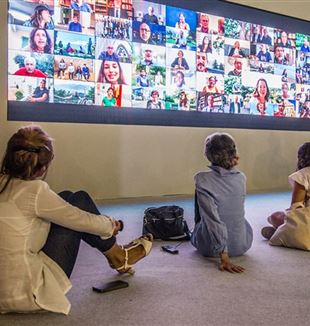
Fr. Giussani: The gaze of a poignant passion
It is one hundred years since the birth of the founder of CL. But there are also "hundreds of encounters, worlds and hearts" that he inspired, some of which can be seen at the Rimini Meeting and in the centenary exhibition.Translated from the original Italian, published on ilsussidiario.net.
A great plain, teeming with people at work, amid dust and shouts, machinery and beams of sunshine in a sky furrowed by clouds. Engineers, poets, workers, scientists stretched out erecting pylons and bridges and ever more daring arches in an immense effort to reach the sky, to reach the Explanation of everything, the Meaning. Fr. Giussani's gaze on the world and on history strikes the visitor of the virtual exhibition (mostra.luigigiussani.org) created on the occasion of the 100th anniversary of his birth and reproposed in a physical form at the Rimini Meeting. It is the gaze of poignant passion, a vision that is both biblical and ultra-contemporary. Babel, the Homeric poems and the megalopolises in which we live, taking the subway or caressing our children: we all, always and everywhere, demand to know the Why, the true Reason. Fr. Giussani penetrates that need to know that we so often leave in the dark - because it is so uncomfortable - and brings it to light, cleanses it of impurities, places it on the table like an unexpected bouquet of flowers that forces us to ask ourselves: Who sent this?
Similarly, the allegory of the great plain implies a question: this work, this frantic search, is it what makes us human? A universality, an immediacy, a surprise is that of Fr. Giussani, who has directly or indirectly reached generations and latitudes. Young Taiwanese people or Arab intellectuals, cardinals in the Vatican curia or American prisoners, Italian journalists or Brazilian lawyers.
"Giussani100," which is the title of this evening's meeting at the Meeting, not only recalls the "one hundred years since his birth," but symbolizes hundreds of worlds, hundreds of hearts, hundreds of encounters. One hundred different suggestions, like those proposed by the exhibition.
For the American professor Joseph Weiler, Fr. Giussani's message is "to feel the presence of the Almighty in life. And this message not only applies to Christians, but also to adherents of other faiths like me - to Jews, Muslims. To feel the presence of the Almighty in life. And I have to thank him for this message."
The French philosopher Fabrice Hadjadj believes that Fr. Giussani has a very unique and revolutionary conception of culture because "it itself speaks to us of Christ. From the moment a great author says something real, he becomes a collaborator of revelation. It is this view that, in my eyes, makes Fr. Giussani a truly exceptional and authentically Catholic figure. Because Catholic means universal, but it also means understanding all of creation in the light of redemption."
Guzman Carriquiry, the current Uruguayan ambassador to the Vatican after a very long period at the Pontifical Council for the Laity, recalls how "it was Fr. Giussani’s theological and educational genius that helped me to revise, to rethink, to reformulate, to deepen my faith: a new gaze on my life. Even today I am still moved when some images come to mind, such as that of May 30, 1998, a memorable day in St. Peter's Square, when I accompanied him toward Pope St. John Paul II supporting him by the arm, and he threw himself on his knees before him. What an expressive image of that co-essentiality of institution, ministry, of the charism, that co-essentiality that our dicastery had been able to recognize through the irruption of movements and new communities in the life of the Church as a providential gift from God."
These are three of the four voices that will participate in this evening’s dialogue "Giussani100." The fourth is that of Maria Francesca Righi, abbess of the monastery of Valserena. As a young woman she was Fr. Giussani’s driver and in that personal encounter she remembers “that he had absolute respect for the freedom of the other and aroused it with his mere way of being. In him I encountered a true paternity, which never took advantage of his authority; rather he helped the person become aware of themselves before Christ."
Thus, Fr. Giussani's human proposal resonates in these contemporary voices. "Why have they been waiting for him so much?” a journalist asked him upon his arrival at the Meeting in 1983.
"Because I believe in what I say."
"That’s all?"
"Yes."#Meeting2022